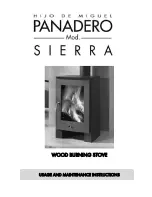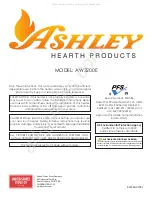
CARE AND OPERATION
FUEL
PAGE 17
REFUELING
To refuel the stove, open the bypass damper and move
the primary air control to "HIGH." Let the fire "LIVEN UP"
for about one minute. Open the fuel door about ½” (1 cm)
and hold in this position about 30 seconds or until the
stove is drafting well. Open the door and add wood. After
refueling, reset the primary draft control to the desired po-
sition, and close the bypass when the catalytic tempera-
ture probe reaches operating temperatures of 600
°
F indi-
cated on the temperature probe.
BYPASS DAMPER CONTROL
The operating handle of your bypass damper control is
located on the front of the stove flue collar. By moving
the bypass damper control, the operator can route the
fire either through the catalytic combustor (pushed in) or
directly up the flue (pulled out). When starting a fire or
refueling, the bypass damper control must be pulled out.
Once the fire is established, it must be pushed in.
CATALYTIC TEMPERATURE PROBE
The catalytic temperature probe monitors the tempera-
ture of your catalytic combustor. Once you have estab-
lished a fire and the catalytic temperature probe indi-
cates the temperature of your catalytic combustor. When
it reaches a temperature of 600 degrees (approximately
20 - 25 minutes), close the bypass damper control. De-
pending on the type and size of the fuel load as well as
the length of time the stove has been burning, your cata-
lytic combustor should operate –between 1000 to 1800
degrees.
When the optional blower is operating it will affect the
temperature probe reading. Turn the blower off for an
accurate reading.
BURN RECOMMENDED FUEL
This appliance is approved for use with untreated natural
dry wood only (see
Important Warnings
, page 2, #8).
Burning materials other than natural wood will shorten
the life of the catalytic combustor. Do not burn particle-
board or pressed logs using bonding agents as they can
produce conditions, which will deteriorate metal or dam-
age the catalyst. Green or uncured wood does not work
well as fuel, and can cause increased creosote buildups
and plugging of the catalytic combustor. The value of
green wood as a source of heat is limited. Do not over-
load or use kindling wood or mill ends for primary fuel as
this may cause overfiring. Overfiring is a condition where
excessive temperatures are reached, beyond the design
capabilities of the stove. The damage that occurs from
overfiring is not covered under the stove warranty.
WARNING: BURNING IMPROPER FUEL (I.E. CHAR-
COAL) CAN RESULT IN
CARBON MONOXIDE POISON-
ING WHICH MAY LEAD TO DEATH!
CARBON MONOXIDE POISONING – EARLY
SIGNS
OF CARBON MONOXIDE POISONING RESEMBLE
THE FLU WITH HEADACHES, DIZZINESS, OR NAU-
SEA. IF YOU HAVE THESE SIGNS, GET FRESH AIR
AT ONCE! HAVE THE HEATER INSPECTED BY A
QUALIFIED SERVICE TECHNICIAN. SOME PEOPLE
ARE MORE AFFECTED BY CARBON MONOXIDE
THAN OTHERS. THESE INCLUDE PREGNANT
WOMEN, PEOPLE WITH HEART OR LUNG DISEASE
OR ANEMIA, THOSE UNDER THE INFLUENCE OF
ALCOHOL, AND THOSE AT HIGH ALTITUDES
.
WHY SEASONED WOOD?
The key to the success of a good fire that produces heat
from a woodstove is the wood. It needs to be well-
seasoned natural wood.
What does “Well-Seasoned” mean? When a tree is cut
down, the wood is green, full of sap and moisture. This
moisture content can exceed 80%, which must be re-
duced to less than 20%. Wood properly seasoned is then
capable of generating the heat the stove was designed
to provide.
Green wood does not burn easily. Attempting to burn
green wood often results in a lot of smoke and very little
fire. Time is the most important factor in seasoning
wood. Ideally the moisture content should be reduced to
11-20%, although very few of us will be able to check
that figure. There are several steps that should be taken
to ensure that that you come close to these figures.
Secondary Air Tube
Bypass Damper Control
Damper
Door
Positioning
Stops
Tunnel Baffle
Catalytic
Combustor
Catalyic Combustor
Retainer Clip
Summary of Contents for 1003C
Page 29: ...SAFETY LISTING LABEL PAGE 29 ...
Page 30: ...EPA LABEL PAGE 30 ...
















































